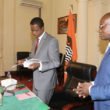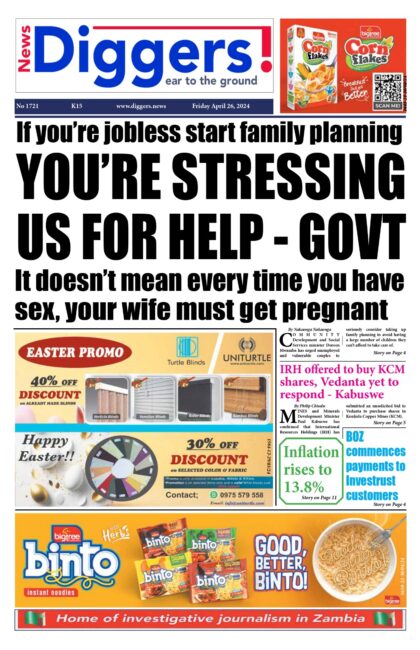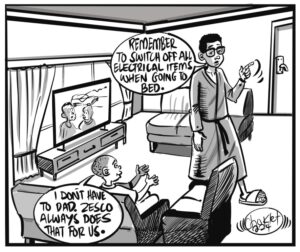Africa Confidential says Zambia’s debt is growing too large to cover up and that the IMF is insisting that the gap between government’s liability figure and its estimated figure is too wide for a bailout package to be possible.
In its latest report published on June 1, Africa Confidential revealed that Zambia’s international reserves had fallen to just US$1.8bn.
“Having said it was certain of its figure, Zambia’s Ministry of Finance has once again revised its external debt upwards, from US$8.7 billion to $9.1bn. While its debt continues to rise, international reserves have fallen to just $1.8bn. and the Kwacha is beginning to totter as the central bank stops defending the currency’s value…Finance ministry insiders say the gap between the IMF’s view and the government’s is too wide for the programme to be possible this year,” the AC has stated. “The Fund’s next mission is not until September, which is far off, given the urgency of the country’s problems. Mwanakatwe is trying to persuade officials to visit in June, the month before the $56 mn tranche of payments on Eurobonds is due. But it is Zambia that has to make the first move, by sending a strong signal to IMF that it will stop borrowing. This will entail unravelling contracted but not yet disbursed loans and is no simple task. Much of the now $9.1 bn. debt stock consists of the Eurobonds, Paris Club obligations and concessional lending from international financial institutions. So far, little of the roughly $8 bn of contracted Chinese project’s finance has been included, yet many large projects are well underway, including almost $800mn worth of airports (and) road projects amounting to further billions of dollars,” read the report.
Africa Confidential observed that the Bank of Zambia’s delay to release data on foreign reserves promoted suspicions that it did not want to admit how low they were.
“In mid-May the Bank of Zambia updated its data on its foreign exchange reserves, which had dropped to a historic low in January, falling between $2bn. The bank is late with its data, prompting suspicions that it does not want to admit how low they are at a time when it needs to be restoring market confidence. The latest charts not only show that reserves fell to $1.8 bn in February but also revived the January figure to include an additional $10mn in debt service payment for reserves,” the report read.
Africa Confidential also listed some payments made by government towards Eurobonds.
“The $50 million paid out for ‘other’ government uses in January is likely to represent an instalment of the $380mn. The London High Court ruled was owed to Libya’s Lap Green. Bank of Zambia data does not go beyond February, but AC understands that the government also used a further $43mn from the reserves to pay another tranche of Eurobond interest in April,” stated the AC.
“The next payment of $56mn is due in July. The dwindling reserves still appear to be the only source of funds for this, exacerbating concern among inverters in the Zambia’s Eurobond… In the week beginning 21 May, the kwacha began losing value again and its now at $10.30 to the US dollar. The weaker currency will only make Zambia’s already unsustainable debt service payment more expensive.”
Meanwhile, Africa Confidential noted inconsistencies in Special Assistant to the President for Press and Public Relations Amos Chanda’s responses in defense of the STAG guarantee.
“State House official spokesman Amos Chanda has been energetically denying Africa Confidential’s article about the US$500 million sovereign guarantee signed by President Edgar Lungu with South Africa’s STAG company on behalf of the state electricity company Zesco. However, a series of contradictions emerged in his defense of the deal and on 29 May the Finance Ministry confirmed the existence of the guarantee claiming it had been intended to cover payments for emergency power. Chanda first defended the guarantee by arguing that Lungu was Minister of Finance when he signed, even though nobody else was aware of it at the time and no government yet existed. The President had not yet been inaugurated in his new term of office and is had no powers,” noted Africa Confidential.
“Chanda claimed the agreement was signed during the third week of August 2016 when in fact, AC’s sources say and the ministry now confirms, it was signed on 9 September. This is important because it was only on 5 September that Lungu had learned that the Constitutional Court had endorsed his election victory by dismissing an opposition petition alleging a fix, prior to that his executive powers were suspended because of the petition. Chanda’s claim that due diligence was taken and the President was ‘satisfied’ with the results is also at variance with the facts. AC understands that due diligence on the deal raised several red flags. The guarantee was cancelled on 24 April by Finance Minister Margaret Mwanakatwe, completing a process set in motion by her predecessor Felix Mutati who was appalled by the arrangement and set about cancelling it as soon as he learned about it. He was appointed finance minister just a week after the deal was signed.












